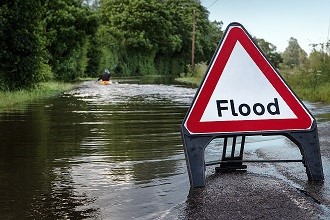Natural Disasters and Severe Weather
Related Site
Environmental Health Division
Floods

A flood is an overflow of water that submerges land that is usually dry. In the sense of "flowing water", the word may also be applied to the inflow of the tide. Floods are an area of study of the discipline hydrology and are of significant concern in agriculture, civil engineering and public health.
Floods are among Earth's most common–and most destructive–natural hazards.
Preparing for a Flood
A few simple precautions can help you avoid possible health risks during a flood. This information answers some of the most important questions about floods and your health.
Cleanup after a Flood: Home and Business
While cleaning up your home or business after a flood, you need to protect yourself against hazards in your food, water, and air. Many hazards aren't obvious and can't be seen—awareness of hazards will help you work safely and protect your health.
Salvaging and Remodeling after a Flood
After the flood waters recede and the cleanup has been done, most folks want to get back into their homes or businesses and start rebuilding. Rebuilding too quickly after a flood can cause continuing problems such as mold growth, insect infestations, and deterioration of the wood and wall coverings.
Fuel oil contamination
An oil spill is a potential fire hazard - Stay Away!
- Report the spill: Minnesota Duty Officer Program (BCA)
Sewage and septic system contamination
Flooding of a sewage system can be a hazardous situation for homeowners and businesses. It may result in sewage backed-up, contaminated drinking water, and lack of sanitation until the problem is fixed.